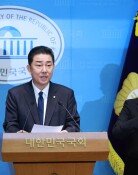[Editorial] Political Pardon under the Disguise of Economic Amnesty
[Editorial] Political Pardon under the Disguise of Economic Amnesty
Posted February. 10, 2007 03:00,
The government announced yesterday the list of 434 people who are to be pardoned to mark the fourth anniversary of President Roh Moo-hyuns inauguration. The government said that it has decided to grant the special pardons to help economic revitalization and heal old conflicts; however, the pardon seems more like a politically motivated one made after much calculation.
This notion seems especially true when considering the pardons granted to former Democratic Party Advisor Kwon Noh-gap, who was the right-hand man of former President Kim Dae-jung, and to Park Jie-won, chief of staff in Kim Dae-jung`s administration. Given the close relationship between the two people and former President Kim Dae-jung, it is possible to suspect that such pardons would be made in an attempt to reshape the political landscape in light of the presidential election scheduled in December. Given the fact that lawmaker Kim Hong-il, the eldest son of Kim Dae-jung, is also included on the special pardon list, it seems that through reconciliation with those once powerful political figures who rallied around Kim Dae-jung, the government is trying to leave room for cooperation with the Democratic party, which subsequently lead to the support from Jeolla province. President Roh also gave amnesty to his close associates on a large scale in marking last years Liberation Day.
Although the government said that it is granting pardons to convicted businessmen to form an atmosphere where businessmen can focus solely on reviving the national economy, it sounds like a lame excuse. If the government is really to revive the Korean economy, it should remove policies that go against the market principles and insist on equality. Ahead of the special pardon made around the Liberation Day last year, when the ruling party asked for pardons of some businessmen to revive the economy, the president did in fact reject their recommendation citing identity issues. It is absurd that the president is now talking about the necessity of the special pardon of businessmen to revitalize the economy.
President Roh pledged during his presidential campaign, There will be no reckless pardons in my administration, and, I would strengthen the standard for amnesty and enhance the effectiveness of law enforcement. However, his pledges have ended up as empty rhetoric.
Many governments have repeated the process of first arresting businessmen and political figures under the grand cause of eradication of corruption upon the launch of the administration, and then granting pardons to them later. If this vicious cycle continues, it will undermine the stability of law and the effectiveness of law enforcement, while encouraging disregard for corruption. Many businessmen have run into troubles due to investigations for illegal contributions to presidential campaign funds whenever there has been a change in the presidency. However, the fact that as many as 48 percent of businessmen responded that they may not be able to refuse contributions if political powers ask them for political funds even after a series of such investigations certainly has something to do with this vicious cycle. Since the presidential special pardon can undermine the principle of separation among three powers of administrative, legislative and judicial branches as well as the authority of the judiciary branch, limits should be made based on a clear principle and national consensus.



![‘건강 지킴이’ 당근, 효능 높이는 섭취법[정세연의 음식처방]](https://dimg.donga.com/c/138/175/90/1/wps/NEWS/IMAGE/2026/01/18/133181291.1.jpg)



